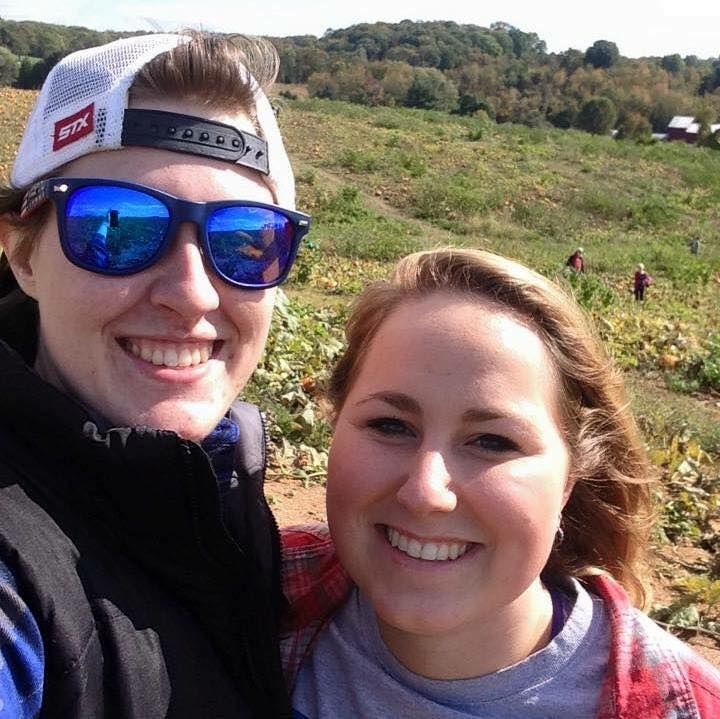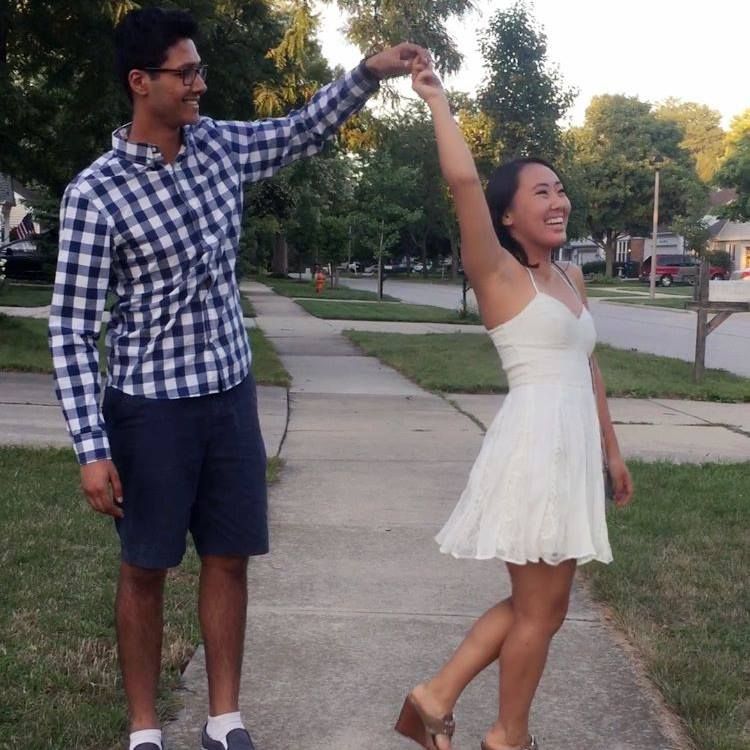By CATHERINE PALMER
News & Features Editor
Though balancing a romantic relationship and the academic load at Hopkins can be difficult, many students say that being in a relationship is worth the effort — regardless of whether your significant other is hundreds of miles of away or right here on campus.
“There’s a lot of things that are really soul-crushing at Hopkins like bad grades… not doing well in your clubs and letting people down. But if you put time into your significant other and really care, you really can’t let them down, which is a really good feeling,” Kyle, a sophomore who elected to use a pseudonym, said. “It’s a best friend. It’s someone who’s always there for you at a school where you really need one. Not like, ‘Oh, I needed a girlfriend.’ But at the same time, I have that person and they’re there for me.”
Beginnings
Kyle met his girlfriend the first day of their freshman year, when they lived in the same hall. However, he believes that finding a significant other is not always that simple, especially given the party-based social scene at Hopkins.
“I would say that there are people out there looking for relationships, and they’re probably a minority on campus,” Kyle said. “In terms of trying to find a relationship and going out to parties, it’s generally not the best thing I’d say if you’re looking really for a good relationship… one that’s going to sustain for a decently long time.”
Sophomore Allie Bull, on the other hand, believes some parties can be conducive to meeting people and forming relationships. She is captain of the Hopkins’ women’s rugby team and met her girlfriend, a senior ice hockey player at Towson University, at a party hosted by the Towson rugby and hockey teams.

“I’ve been to frat parties here at Hopkins and, for me, that’s just not my scene, so I don’t think I would ever meet someone meaningful there... Those aren’t the type of people that I would personally want to meet,” Bull said. “Through rugby I have that whole group of people that kind of are conducive to what I like to do, and we all get along because we have that shared interest. And it’s obviously really LGBT friendly.”
Bull explained what she sees as the differences between heterosexual and LGBTQ relationships.
“It seems a lot more serious in college at least for LGBT [couples]. [For] a lot of people, it’s their first real experience in a real relationship,” Bull said. “I’m surrounded obviously by a lot of people who are similar to myself, and it just seems a lot more serious and less whimsical, cavalier, which is interesting.”
However, she does not believe the recent nationwide legalization of same-sex marriage has deepened the seriousness of college LGBTQ relationships.
“Everyone’s excited about it, but I don’t think I was like, ‘Oh my God, we can actually get married. Let’s really lock this down,’” Bull said. “It’s just a positive aspect, something you can look forward to, but not really something that I’m looking forward to right now, and neither is she.”
Senior Ramy Chin met his girlfriend Mey Okazaki, Class of 2015, through a mutual acquaintance midway through the spring semester last year. They had only a short amount of time to spend together on campus before Okazaki, a junior at the time, graduated early in May. Okazaki is now working in New York while Chin is completing his senior year at Hopkins.
Sophomore Zaya Amgaabaatar, on the other hand, met her boyfriend over three years ago as a sophomore in high school.
“We only happened to meet because we had a mutual friend, but otherwise we probably wouldn’t have crossed paths, especially because he was in a different grade. My high school’s very segregated into the grades you are in,” Amgaabaatar said.
They dated throughout her junior and his senior year. He then went off to a state school about three hours from their hometown, and they began a long-distance relationship. One year later, Amgaabaatar started her freshman year at Hopkins. She said they made their choices of where to go to college independent of their relationship.
“We always mutually encouraged each other to go to the best school for the person as an individual and the relationship would follow. And if it didn’t, then that says more about the relationship... College proximity shouldn’t make or break a relationship,” she said. “Both of us chose our respective colleges totally separate [from] our relationship because we knew the relationship can mold and adapt, but if you don’t like your college, it’s a lot harder to change that once you’ve committed.”
Unlike Amgaabaatar and her boyfriend, many couples do not survive the transition from high school to college, as Kyle explained.
“Everyone knew there was a horizon and graduation... Most couples I know broke up the minute they graduated pretty much,” Kyle said. “But at this point, you might stay together longer than college... It was like a status symbol [in high school]. I think college relationships are definitely closer to the real thing.”
Miles apart
“School is very different now,” Chin said. “It’s almost like a daily part of your school life essentially, seeing your significant other. And then when that person is no longer physically there for you guys to meet up, it’s very empty. It feels like something’s missing. Initially, it took a little bit to get used to emotionally. It does get to you a bit. But I think definitely one thing that helps me get through this is there has to be some kind of greater goal... If you can’t see that future, I think then it’s going to be extremely difficult on both ends to get through it.”

Okazaki agreed that it was hard to adjust to not seeing each other every day at school.
“I have not been in a long-distance relationship before or a long-term relationship in the first place, so it was really hard for me to get used to it. But it’s definitely worth it,” Okazaki said. “It’s a little bit easier because I can see him at least once a month because I live in New York right now, and he’s in Baltimore, so I can just take a bus and see him.”
Amgaabaatar believes the distance has strengthened her relationship with her boyfriend.
“I think going long-distance, it forced us to mature, at least relationship-wise, a lot faster than some of our friends,” Amgaabaatar said. “I really noticed that where we are today is so different than where we were when we we’re dating in high school — part of it’s obviously just because we’ve gotten older... I firmly believe that we definitely would not be as strong as we are as a couple if we hadn’t gone long-distance.”
She said the fact that her boyfriend went off to college first also made it easier for them to adjust.
“He came home every couple weeks, and sometimes I’d go down there. We made it work just because we were manageably close,” she said. “And so we had experience doing [long-distance] when I went off and came here to Baltimore, when we don’t see each other beside major breaks.”
Keeping in touch
All of the couples cited communicating frequently both in person and remotely as key to maintaining relationships.
“[We] keep each other as integrated in each other’s lives as is possible. So even though I haven’t met a lot of his friends, he’s talked about them enough to where I feel like I know them,” Amgaabaatar said. “We try to allocate some time to Facetime or watch the same thing on Netflix at the same time.”
Chin said talking throughout the day is especially important in long-distance relationships.
“I let her know if I’m doing something. ‘Hey, I’m at the gym.’ Or ‘Hey, I’m at the library.’ I just want to let her know as much as possible so that I don’t leave her hanging. We keep each other updated so that they’re in the loop as much as possible,” Chin said.
Bull noted that distance is always taxing. While her girlfriend lives and goes to school in Baltimore, Bull is from Vermont.
“We started dating last spring, so summer was the first big break, and that didn’t go well. We ended up taking a break. And it didn’t go very well just because it was so far in distance,” Bull said. “But looking forward, we’ve made it a point that we’re not going to spend huge amounts of time apart. So for Thanksgiving, she’s going to come to Vermont with me, and we’re going to spend some time in Vermont over winter break, but then we’re going to go to Florida together... The distance is really tough because I was in a long-distance relationship before I met her with someone in England and that was just awful. So we’re working hard to not have the distance.”
Bull thinks technology can sometimes be a hindrance to relationships.
“Technology is your best friend, which is great because it helps you connect with them. But at the same time, your phone is like your social life and that becomes kind of constrictive over a long period of time, so that’s what I experienced with the girl in England,” Bull said.
Many of the couples that explained going long-distance makes time spent together in person much more meaningful.
“I think long-distance has made me appreciate even just the small things like to sit around, watch a movie,” Chin said. “When you’re not seeing each other every day, it’s just simple things turn into very different, almost like emotional, special moments, even though again it doesn’t really seem like much to anyone.”
Okazaki echoed the sentiment.
“When we see each other... to be next to each other is enough,” Okazaki said.
Compromise
“As Hopkins students we’re all busy with academic commitments, extracurriculars, friends within campus, so you have to allocate let’s say 30 minutes, an hour every single day or every other day, whatever works for the couple,” he said. “If you don’t, then I think emotions and feelings — it’s very easy for that kind of stuff to start fading, and you just kind of lose sight of the greater reason of why you decided to do long-distance in the first place.”
Bull said that time-management is difficult, especially since she lives close to her girlfriend.
“Trying to balance going there and also staying here and having enough time to do work is hard, and sometimes I screw that up... so I’m still trying to figure out how to balance it better. It’s also hard because our homework loads are a lot different, so she’ll have more free time and I’ll be like, ‘Oh, crap, I have to read a whole book.’ So that’s tough,” Bull said.
Amgaabaatar explained that academics often needs to be prioritized, especially since she and her boyfriend cannot work on homework together like some couples at Hopkins.
“When we both are really, really busy, we basically have to not talk for good portions of the day or all day or two just because there are other things that need to happen that aren’t conducive to texting,” she said. “It’s harder just because our means of communication are a lot more limited. But at the same time, when we do have free time or down time, then what I want to do is fill him in or catch up.”
In addition to focusing on academics, maintaining friendships is also important for many students in relationships, according to Chin.
“I have to kind of force myself to think... I’m not there physically with her, but she needs time for herself to spend some time with her co-workers or friends back in New York,” he said. “I completely respect that, and I understand. I think one of the hard challenges that long-distance couples face is jealousy and not being there and just feeling kind of left out of the loop. During the weekends, for example, I’ll allocate certain days of the weekend just for Mey.”
Amgaabaatar, on the other hand, thinks making time for friends is actually easier when you’re in a long-distance relationship.
“I see my friends way more easily and automatically than I see him. So the time that I maybe would have spent with my boyfriend if he did go here, I spend with my friends,” she said.
Kyle explained that maintaining opposite gender friendships, in particular, can be difficult and contentious.
“Girls who are in relationships — if a guy has a really close girl friend who he’s talking to, girls don’t want him being closer with that girl friend than his actual girlfriend,” Kyle said. “Girls, when you see a guy in a relationship, it’s almost like a green light. He has a stamp of approval. He’s going to be a good person. He’s not going to hit on you. You’re not going to feel threatened by him... He’s going to be an actual friend, which is a good thing.”
Correction: The article previously stated that Allie Bull's girlfriend plays on the Towson field hockey. She actually plays on the Towson ice hockey team.





